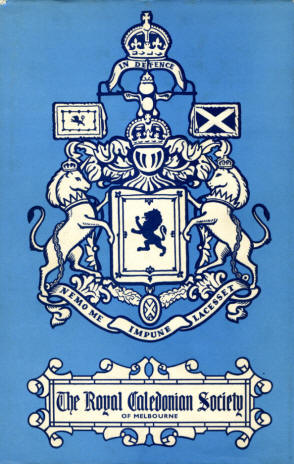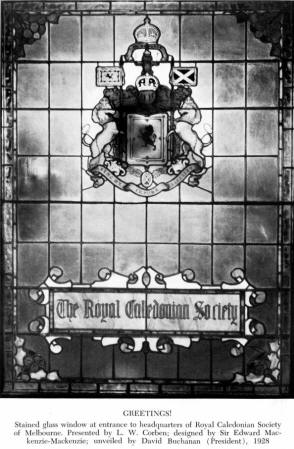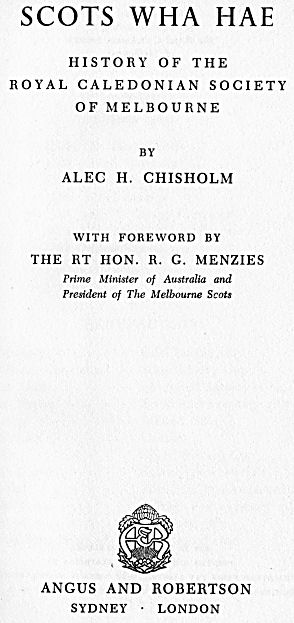|

Alastair,
At last night's meeting of the Council of the Royal Caledonian Society of
Melbourne, I was directed to advise you of the Council's approval of your
placing "Scots Wha Hae" on your website. Please proceed accordingly.
David S. Thomson
Honorary Secretary
November 08, 2006
THIS
book (by a well-known writer) the first detailed history of a Scottish
society in Australia, is not merely a narrative of the career of the
distinguished organization which it represents, but, as the Prime Minister
points out in his Preface, is also an informative and entertaining story.
Its basic purpose is to set
on record the national service rendered, since 1858, by the body now known
as the Royal Caledonian Society of Melbourne. It does that; and, in
addition, it tells many amusing tales while outlining the important
influence which Scots have had on Victoria as a whole.
More than that, there is a
Postscript in which is discussed in some little detail the part that
Caledonians have played in the building of Australia generally. It is a
striking statement, and, taken in conjunction with the body of the book,
it establishes the author's point that Australian Scots are justified in
doing a trifle of "blowing"-if only on the bagpipesl
Foreword
By The Right Honourable R. G.
Menzies, K.C., M.P. Prime Minister of Australia and President of The
Melbourne Scots
MY friend Alec Chisholm has
written a careful but entertaining history of the Royal Caledonian Society
of Melbourne. He now appeals to my pride by asking me to write a foreword.
My qualifications for
performing the task are sketchy. I am a Scot on my father's side. The
Melbourne Scots have done me the honour of making me their President. But
(and here's a serious subtraction), I have no Scots burr on my tongue, I
have not yet (oh, shame!) worn a kilt, and cricket commands my love much
more than tossing the caber. Why, then, this honour? The answer is simple.
We Scots have memory but no regrets; pride but no envy. In our modest way
we admit that J. M. Barrie was right when he said, in his Rectorial
address at St Andrews (where my paternal grandmother was born) that "We
come of a race of men the very wind of whose name has swept the ultimate
seas."
Many of the early
pastoralists of Victoria were Scots lowland farmers; Scots figured
importantly in the foundation of Melbourne's business. They have (as Mr
Chisholm shows) played a prominent part in politics, possibly out of
proportion to their actual numbers in the population. Why is this? As
witnesses, both Mr Chisholm and I may be found disqualified by bias. But,
if allowed to testify, I think we might say that there are two Scots
characteristics which endure, which the world values, and which mankind
needs.
One is a sense of
continuity. No great good is done by those who say, "Let us eat, drink,
and be merry, for tomorrow we die." But the man who feels pride in the
past and a sense of responsibility for the future, though he may be called
"dour", or "canny", or even-in Barrie's celebrated phrase-"a Scotsman on
the make", does much for development and growth and the stability of
society.
The second characteristic
is allied to the first. It is the spirit of independence. That spirit is
today in the twilight. We have learned to lean, to criticize, to expect,
to see our neighbour's duty much more clearly than our own. It is
impossible to believe that this is a permanent state of mind. But if and
when we come out of it, the sturdy independence of the sons and grandsons
of Caledonia will have played some part in the revival.
Canberra.
April 26th, 1950.
Electric Scotland Note:
We received an email from John Williamson to say...
Dear Alistair,
I recently published a
book about early Australian Rules football, titled "Football's Forgotten
Tour" (ISBN 0958101809). It was fully researched with all sources
tabulated. In ElectricScotland the Victorian Royal Caledonian
festivities held on the MCG in December 1861 are mentioned, together
with a copy of the Programme. On this Programme is mentioned a "FOOTBALL
MATCH, which as the article mentions was an Australian Rules game. (then
referred to as 'Victorian' Rules). According to the article the game
didn't take place, but the newspapers of the time have an account of the
game which was played between Melbourne and University and it featured
men who drew up the first rules for Australian football including two
masters of Scotch College.
What makes this game so
special is that the Caledonian Society donated a "HANDSOME SILVER CUP"
for the winner of the contest but as the match ended in a draw it was
played for as The Caledonian Challenge Cup for the next few years making
it not only the first Cup for Australian Rules football but the oldest
Championship trophy for any form of senior football anywhere in the
world.
It was contested by
Melbourne, University, Carlton, Royal Park, South Yarra and
Geelong until August 1864 when Geelong won it outright.
The earliest senior
competition for Rugby Football commenced in 1863 and the English
Football Association Cup was inaugurated in 1871.
After 1864 the Caledonian
Challenge Cup vanished from history, like so much of the faded and
forgotten memories of the early pioneering Scots in Australia.
Yours sincerely
John Williamson


Author's Note
THE statement was made in
1908, by a man who knew his subject, that the Caledonian Society of
Melbourne had "a history of which it might well be proud". It is believed
that the present book will strengthen that claim.
Begun in 1948 at the
request of the Council of the Royal Caledonian Society, the work has been
carried through with the aid of newspaper records, minute-books, the files
of the late Scot at Hame an' Abroad, and recollections of older members.
From those sources it has been possible to obtain a substantial body of
information, although, regrettably, a partial gap remains between the
formation of the original Society in 1858 and the reconstruction of 1884.
Necessarily, this History
is largely "domestic". In its broader aspects, however, it gives notes on
many public personalities of other days; and because of that, and because
it sketches the history of the Scottish Union and has references to
numerous kindred bodies, it may fairly be regarded as a worth-while
addition to the story of Victoria.
We do well to revive data
regarding men who built up our Society and whose names have become, in
many instances, either wholly or partly forgotten. Aside from the claims
of history (and history, of course, is the head-waters of civilization)
there is the consideration that we should give our predecessors the
justice which we ourselves would wish to receive. As an old Scot once
said, when his crony declined to attend a burial, "How can you expect folk
to go to your funeral if you won't go to theirs?"
But, of course, the history
of Melbourne's Caledonians is only one facet of the story of Scots in
Australia. That story as a whole is extremely impressive. It has never
been told in detail, possibly because Scots are (sometimes) unduly modest!
Accordingly, a summary of the subject is given as an addendum to this
book.
It is revealed in the
addendum that Australia today possesses nearly two hundred Scottish
societies and pipe bands (to say nothing of half a dozen statues of Robert
Burns), and several Scottish hospitals and kindred institutions as well.
It is revealed also that a mere score of Scottish-Australians have,
between them, given to this country cash and property to the value of
about £3,000,000.
In addition, it is shown
that, beginning with John Hunter (who arrived with the First Fleet in 1788
as Deputy Governor to Phillip ), Scots have figured very importantly in
exploration, vice-regal administration, politics, science, education,
medicine, law, literature, journalism, art and other activities in
Australia.
Not least important, it is
further shown that Australia is indebted to Scotland for her Queen of Song
(Dame Nellie Melba); and, by way of emphasis, for the man who wrote
"Advance Australia Fair" and the man who wrote "Waltzing Matilda".
Such a record, it will
surely be agreed, justifies Scottish-Australians in doing a trifle of
"blowing" - if only on the bagpipes!
A. H. C.
December 1949.
Contents
Patrons, Benefactors, Presidents, Secretaries and Outstanding Events
Chapter I
In the Roaring 'Fifties - A Useful Tombstone - Five Caledonian Societies
before 1860 - Scottish Explorers - Getting home before dark - No "English"
Queen - Donald Kennedy as first Chief - Strong Committees.
Chapter II
A Relic of 1858 - Caledonian Festival in 1860 - First English Cricket
Eleven Routed - "A Little Pig in a Narrow Gate" - From Archery to Shinty -
Old Programme Survives - Distinguished office-bearers.
Chapter III
Reconstruction in 1884 - Hon. James Munro's Explanation - "Caledonian
Society of Melbourne" - Hon. James MacBain as first President - "Brilliant
success" of first social - Governor attends St Andrew's Dinner - Twelve
toasts in one night - 394 members in first year - First sports meeting,
rent free - Protest against "anglicising".
Chapter IV
Society's President knighted - Lord Rosebery presents gold Cup "Uncrowned
King of Scotland" - 567 members in two years - Hon. James Munro becomes
President - Testimonial to Secretary - Dr Cameron Lees visits "this noble
City" - Lord Hopetoun as Patron "The Herd Laddie" and Donald Dinnie -
First Smoke Night and Picnic.
Chapter V
Financial troubles in early 'Nineties-Some domestic disputes - Theodore
Napier and Bannockburn - "Boisterous and insulting" conduct - Mayor of
Melbourne walks out - New secretaries - Ball shows profit of £1/19/3 -
Ladies not admitted - Sir John Mclntyre, Sir Malcolm McEacharn, and Lord
Brassey - Society's remarkable record to 1898.
Chapter VI
George Gibb as President - Sir Hector Macdonald entertained - Society
loses Lord Hopetoun - Great singer welcomed - Sir John McIntyre's
achievement - Formation of Scottish Regiment - Burns Statue unveiled -
"Scot at Hame an' Abroad" founded - Fourteen new Scottish societies in
four years.
Chapter VII
Many Scottish singers appear - "Excellent bioscope pictures" - Foundation
of Victorian Scottish Union - George Gibb as first President - J. S.
Yorston's long service begins - That word "English" again - Death of
George Gibb - New Officers - Andrew Thomson supports immigration.
Chapter VIII
Distinguished guests - "It was a thing tae dream aboot" - Progress of
kindred societies - 31 new Scottish bodies in eight years - King O'Malley
discovers Scottish blood - A haggis "drowned" in Carapooee Creek - Jim
Center arrives - George Dickson's Empire Dance - Scottish cricketers rival
South Africans - A "road hog" strikes trouble.
Chapter IX
Sir T. Gibson Carmichael farewelled - Reception to young Marquess of
Linlithgow - Prime Minister Fisher again with fellow-Scots - W. D. Leckie
becomes Secretary - New rooms at Queen's Walk - Dr Taylor Downie's "house
warming" - Progress by "leaps and bounds" - "Clearing sale" for hackneyed
songs - More new societies - Fatal accident to Alex. Dick.
Chapter X
General Sir Ian Hamilton as guest - His views of Japanese in 1914 - "I
belong to the Caledonian Society" - Harry Lauder covets the Peacock laugh
- Sir Ronald Munro - Ferguson as Patron - World War I breaks out - Prime
Minister Andrew Fisher attends St Andrew's Dinner - Work for patriotic
purposes - Society favours conscription.
Chapter XI
Society's character changes - Formation of The Melbourne Scots - Deaths of
A. G. Steven, poet, and J. Center, champion piper - Medal for Scotch
College - Society receives Royal Charter - Oath of Allegiance introduced,
1921 - Society acquires premises in Russell Street - Prime Minister Bruce
performs opening ceremony.
Chapter XII
Distinguished guests - Lemonade in Rosebery Cup - Premier Allan's striking
figures - Burns Club within the Society - Japanese officer sings for
Caledonians - J. T. Picken's fine record - Death of Lord Rosebery - Thomas
Ritchie becomes President - Wm D. Leckie retires after 17 years as
Secretary - L. W. Corben's gift - Pipe Band wins in W.A.
Chapter XIII
Big delegation visits Scotland, 1928 - Reception by present King and Queen
- Scottish delegation visits Australia, 1934 - Society receives
presidential chair - Second delegation to Scotland, 1936 - "The Scot"
closes down - Andrew Thomson's achievement - Death of Gregor Wood - George
Dickson's "Pageant of Empire.
Chapter XIV
Days of Depression - Russell Street premises sold - Move to Manchester
Unity Building - Fiftieth birthday celebrated - Victoria's Centenary
honoured - John Stewart retires from secretaryship - E. W. James
appointed, 1939 - Scottish Union affairs - Numerous gifts and trophies.
Chapter XV
National work in wartime - 727 food parcels for Britain - More
distinguished guests - Thomas Ritchie as first Chief - Pipe Band wins
Dewar Cup - Lord Montgomery autographs drum - Society gives college
scholarships - Warm welcomes for New Settlers - R. G. Menzies again Prime
Minister.
Postscript
Summary of Scottish activities throughout Australia |

